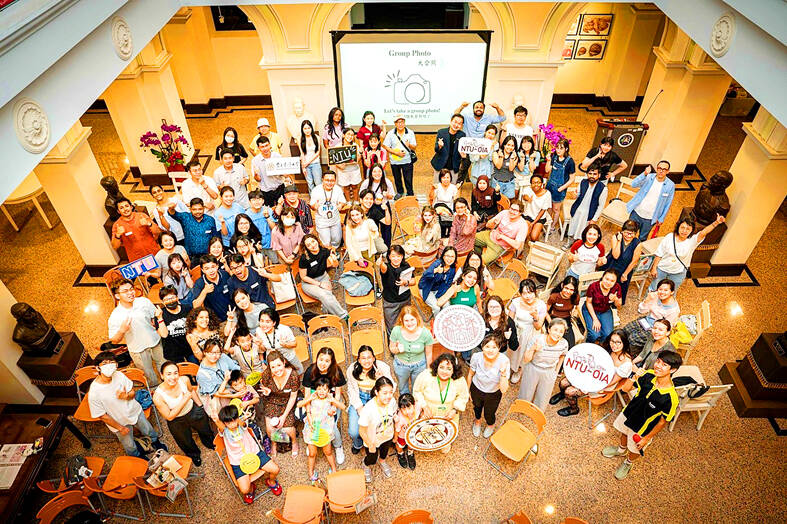The Ministry of Education yesterday released its latest census on overseas students, showing that international enrollment has nearly returned to pre-COVID-19-pandemic levels, driven by a surge in Vietnamese students and more Indonesians pursuing full degrees.
A total of 123,188 international students studied in Taiwan last year, compared with 90,895 in 2020 and close to the 128,157 recorded in 2019, the census showed.
The ministry attributed the rebound to incentives and scholarships offered through its recruitment programs.

Photo courtesy of the Ministry of Education
Vietnamese students made up the largest group, rising to 39,695 from 27,883 in 2023. About 76 percent were enrolled in full degree programs rather than short-term study, the census said.
In line with the government’s New Southbound Policy and broader migration strategy, the ministry said it has continued to expand recruitment channels through programs such as the International Industrial Talents Education Special Program, the Recruitment of Hong Kong, Macau and Other Overseas Students for the Core Industries Program and the International Programs of Industry-Academia Collaboration in Taiwan.
The initiatives aim to provide schools with more flexible options for attracting international students, it said.
Vietnam is among the countries where the ministry is boosting recruitment incentives, alongside Malaysia, Indonesia and Thailand, the ministry said.
The number of students from Myanmar ranked seventh overall, but has been rising quickly, from 928 in 2020 to 2,973 last year, the census showed.
Most Burmese students come from expatriate families, the ministry said, adding that the growth was likely influenced by local political conditions and Taiwan’s recruitment policies.
To sustain this momentum, the ministry said it would continue subsidizing the University Entrance Committee for Overseas Chinese Students, enabling it to lead university delegations to Myanmar and introduce students to opportunities in Taiwan.
However, while Indonesian and Malaysian students remained the second and third-largest sources of overseas students, numbers from both countries have been declining.
The total number of Indonesian students overall decreased by 234, but the number seeking degrees has increased by 20 percent, or 2,053 people, the census showed.
The decline in Malaysian students was likely due to falling birthrates in the Malaysian Chinese community, the high costs of overseas study and the expansion of higher-education opportunities locally, the ministry said.
By percentage, Vietnamese students comprised the largest share of Taiwan’s international student population last year at 32.2 percent, followed by Indonesia at 13.2 percent, Malaysia at 7.9 percent, Japan at 7.1 percent and Hong Kong at 5.6 percent.
As China has continued to bar students from studying in Taiwan since suspending permits in 2020, only 3,489 Chinese students remain, all of whom are continuing their studies. They accounted for just 2.8 percent of the total, the ministry said.

The manufacture of the remaining 28 M1A2T Abrams tanks Taiwan purchased from the US has recently been completed, and they are expected to be delivered within the next one to two months, a source said yesterday. The Ministry of National Defense is arranging cargo ships to transport the tanks to Taiwan as soon as possible, said the source, who is familiar with the matter. The estimated arrival time ranges from late this month to early next month, the source said. The 28 Abrams tanks make up the third and final batch of a total of 108 tanks, valued at about NT$40.5 billion

Two Taiwanese prosecutors were questioned by Chinese security personnel at their hotel during a trip to China’s Henan Province this month, the Mainland Affairs Council (MAC) said yesterday. The officers had personal information on the prosecutors, including “when they were assigned to their posts, their work locations and job titles,” MAC Deputy Minister and spokesman Liang Wen-chieh (梁文傑) said. On top of asking about their agencies and positions, the officers also questioned the prosecutors about the Cross-Strait Joint Crime-Fighting and Judicial Mutual Assistance Agreement, a pact that serves as the framework for Taiwan-China cooperation on combating crime and providing judicial assistance, Liang

A group from the Taiwanese Designers in Australia association yesterday represented Taiwan at the Midsumma Pride March in Melbourne. The march, held in the St. Kilda suburb, is the city’s largest LGBTQIA+ parade and the flagship event of the annual Midsumma Festival. It attracted more than 45,000 spectators who supported the 400 groups and 10,000 marchers that participated this year, the association said. Taiwanese Designers said they organized a team to march for Taiwan this year, joining politicians, government agencies, professionals and community organizations in showing support for LGBTQIA+ people and diverse communities. As the first country in Asia to legalize same-sex

MOTIVES QUESTIONED The PLA considers Xi’s policies toward Taiwan to be driven by personal considerations rather than military assessment, the Epoch Times reports Chinese President Xi Jinping’s (習近平) latest purge of the Chinese People’s Liberation Army (PLA) leadership might have been prompted by the military’s opposition to plans of invading Taiwan, the Epoch Times said. The Chinese military opposes waging war against Taiwan by a large consensus, putting it at odds with Xi’s vision, the Falun Gong-affiliated daily said in a report on Thursday, citing anonymous sources with insight into the PLA’s inner workings. The opposition is not the opinion of a few generals, but a widely shared view among the PLA cadre, the Epoch Times cited them as saying. “Chinese forces know full well that